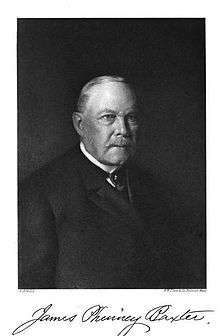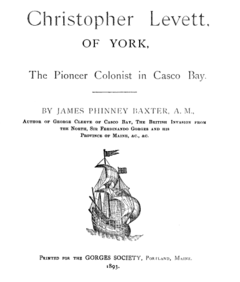James Phinney Baxter
James Phinney Baxter (March 23, 1831– May 8, 1921) was an American politician, businessperson, historian, civic leader, and benefactor of Portland, Maine.[1][2] He was elected as mayor of Portland for six single-year terms between 1893 and 1905.
James Phinney Baxter | |
|---|---|
 | |
| 38th Mayor of Portland | |
| In office 1893–1896 | |
| Preceded by | Darius H. Ingraham |
| Succeeded by | Charles H. Randall |
| 42nd Mayor of Portland | |
| In office 1904–1905 | |
| Preceded by | Frederic E. Boothby |
| Succeeded by | Nathan Clifford |
| Personal details | |
| Born | March 23, 1831 Gorham, Maine |
| Died | May 8, 1921 (aged 90) Portland, Maine |
| Political party | Republican |
His personal library, containing over 100 leather-bound books of maps, portraits, engravings and personal letters, is available for reference at the Portland Public Library.[3]
Biography
James Phinney Baxter was the son of Dr. Elihu Baxter and Sarah Cone Baxter.[4] He was born in Gorham, Maine (in what is now called the Baxter House), on March 23, 1831, but lived in Portland from 1840. He attended Master Jackson's School until 1844, and then Lynn Academy until 1848. He began work in the Boston law offices of Rufus Choate, but ill health forced a return to Portland, where he worked in a dry goods importing business with William G Davis, pioneering a canning and packing business (Portland Packing Company) that became important to the state's economy.[5]
He used the wealth engendered by his successful business for many philanthropic purposes. He was particularly passionate about supporting educational endeavors, and donated a public library (the Baxter Memorial Library) to his birthplace, Gorham, and a library to his adopted city, Portland.[5]
He was mayor of Portland for six years, and the moving spirit behind Baxter Boulevard, a tree-lined road that circles the edge of Back Cove, which is often used for exercise and recreation. He was also recognized as an authority on New England history, and among his other interests, he was president of the Maine Historical Society for thirty years and an overseer of Bowdoin College, and connected with many other organizations that furthered the interests of New England history. One of his greatest literary and historical achievements was the editing of twenty of the twenty four volumes of The Documentary History of Maine.[5]
Baxter also devoted several years to unearthing the details of Capt. Christopher Levett's settlement at Portland in 1623–1624. An English sea captain and explorer, Levett's history and the details of the colony he attempted to found had been largely forgotten when Baxter's scholarship illuminated them. Baxter later published a book about Levett, which incorporated the text of Levett's own earlier work, published in 1628 in London.[5]

In 1887 Baxter was elected a member of the American Antiquarian Society in 1887.[6] He was elected a Fellow of the American Academy of Arts and Sciences in 1915.[7] Baxter was a member of the Maine Society of Colonial Wars.
Baxter died in 1921 at the age of 90, and a Congregationalist pastor officiated at his funeral, although Baxter was also affiliated with the Swedenborg Church.[8]
His son, Governor of Maine (1921-1924) Percival Proctor Baxter, wrote a short biography of his father, James Phinney Baxter, Historian in 1921. https://archive.org/details/jamesphinneybaxt00baxt concluding with "My father had faith in mankind, faith in the future of America, faith in God and faith in the world to come."
According to Percival in this biography: “Two provisions of his will deserve special mention. First, he provided that none of his fortune ever should be paid to any person who practiced vivisection. He could not bear to think of the sufferings inflicted upon dumb creatures in the name of “science.” Second, he recognized the services of incalculable value rendered to this Nation and the world by the Pilgrims, Puritans and other early pioneers of New England. They were the founds; the were the master builders of the Nation; to them belonged the laurels. My father bequeathed $50,000 to the City of Boston, this sum to accumulate at interest until it should amount to $1,000,000, at which time (estimated 63 years from his death) it is to be used to construct a “New England Pantheon,” or memorial building in which are to be portrayed and recorded the lives of those New England men and women who made this country what it is.”
Writings
He published: New International Encyclopedia
- The Trelawney Papers (1884)
- George Cleeve and His Times (1885)
- The British Invasion from the North (1887)
- Sir Ferdinando Georges and his Province of Maine (1890)
- Christopher Levett, of York: The Pioneer Colonist in Casco Bay (1893)
- The Pioneers of New France in New England (1894)
- The Voyages of Jacque Cartier (1906)
- "The Greatest of Literary Problems: The Authorship of the Shakespeare Works (1917)
Descendants
Descendants of James Phinney Baxter include:
- Percival Proctor Baxter, Governor of Maine
- James Phinney Baxter III, President of Williams College
References
- "www.gorhamschools.org" (PDF). Archived from the original (PDF) on 2015-06-24. Retrieved 2015-06-24.
- maineencyclopedia.com
- Portland Room Special Collections
- The New England Historical and Genealogical Register (1921)
- The New England historical and genealogical register, Volume 75 pg. 163 (July 1921) No. 299, New England Historic Genealogical Society
- American Antiquarian Society Members Directory
- Book of Members, 1780-2010 Chapter B, American Academy of Arts and Sciences
- "History of Portland New Church". Archived from the original on 2011-07-28. Retrieved 2010-01-20.